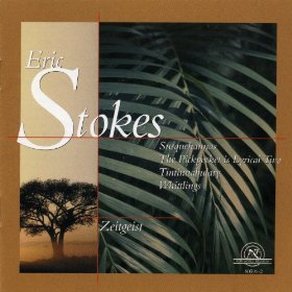Whittlings (1992)
by Eric Stokes
This one-movement work is composed as a sonic metaphor on the art of whittling. Imagine an experienced craftsman working on a block of fine-grained wood with very sharp blades. The artisan’s task is to shape the outcome by taking away much of the woodblock. One could take the view that the saxophone is to some degree the agent of the whittler or the actual whittling instrument but that view is much too simplistic. Imagine instead that all of the sounds made by the players (including the sax) are the literal actions taken in the process of paring away at the sonic possibilities inherent in the Zeitgeist ensemble. One other element to consider is the 22-beat pattern which repeats incessantly throughout Whittlings. In one way, that might be heard as the gestures of the whittler(s). In another way, one might also hear the repeating beat pattern as the actual block of material on which the whittlers, including the composer, are at work, paring away sound by sound. Finally, we are left to contemplate nothing more nor less than our own memory of our experience in hearing the performance. Did a whittled object emerge as an artifact, a memory of the metaphorical process? Or as Yeats writes in his poem “Among School Children,” are we left with a philosophical puzzle:
O body swayed to music, O brightening glance, How can we know the dancer from the dance?
Zeitgeist enjoyed a long association with Eric Stokes, beginning with the band’s inception in 1977. He generously served us as composer, advocate, board member, gadfly, and friend. Eric Stokes (1930–1999) studied music at Lawrence College and composition with Carl McKinley and F. Judd Cooke at the New England Conservatory and with Dominick Argento and Paul Fetler at the University of Minnesota. From 1961 to 1988 he taught at the University of Minnesota, becoming a professor in 1977. Eric Stokes’ early compositions (1955–62) are tonal and lyrical; among them, Smoke and Steel shows the interest in American subjects that became a vital aspect of his work. From 1963, Stokes’ style has expanded to include collage, theater, and mixed media pieces; these works reflect the influence of Ives in their use of stylistic juxtaposition, of Henry Brant in their spatial deployment of forces, and of American jazz, hymns, and folk songs. Stokes’ first opera Horspfal (produced by the Minnesota Opera Company in 1969) concerns the misadventures of American Indians since the coming of white men. It is a spatial work combining film and collage procedures with the vocal and instrumental forces. This unique compositional design is directed in some episodes by as many as 4 conductors assisting the principal conductor. One of his last works, a large-scale work for chorus, band, and narrator titled Out of the Cradle, was premiered by the University of Minnesota choir and wind ensemble in 2000.
Whittlings appears on Zeitgeist’s album Eric Stokes (New World Records © p 2002)
Buy the album:
iTunes
Amazon
New World Records
and at Studio Z

